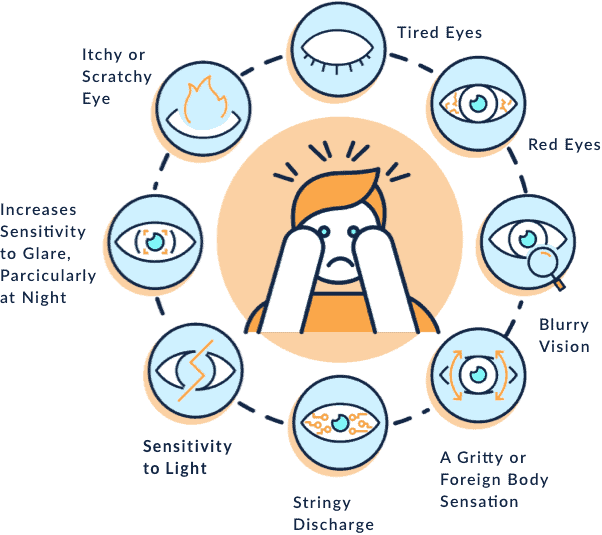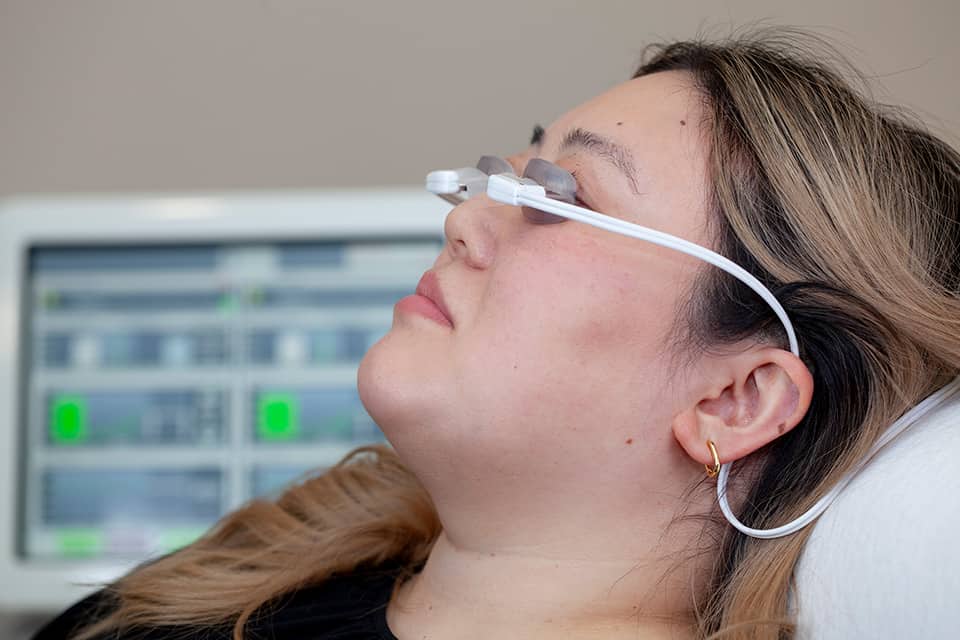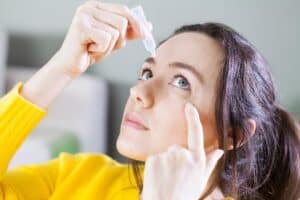Do you suffer from irritated or dry eyes? Boston eye surgeon Dr. Ernest Kornmehl can identify the various dry eye causes and symptoms to help you take the first steps towards dry eye relief. Dr. Kornmehl also understands that it is important to be properly evaluated for the condition if you are considering laser eye surgery so that the refractive procedure can be properly tailored to your unique situation.

What is Dry Eye?
Dry eye is a chronic condition that occurs when a person doesn’t have enough quality tears to adequately moisturize and nourish the eyes resulting from inadequate production or rapid evaporation. Tears are critical for eye health and clear vision, and when the quantity or quality of the tears is compromised, the eyes can feel constantly dry and irritated. The condition progressively worsens, and the most advanced cases can lead to inflammation and possibly scarring on the surface of the eye.
What Causes Dry Eye?
A normal, healthy eye constantly produces tears that bathe the cornea, or the clear covering of the eye. The tears are composed of a complex chemistry of water, mucous and oil. People with dry eye either do not produce enough tears to lubricate the eye, or the composition of the tears is off and they prematurely evaporate from the surface of the eye. Evaporative dry eye occurs when there is a problem with the meibomian glands, which produce the oily substance that prevents the evaporation of tears.
Common Dry Eye Causes:
- Contact lenses
- Age: As we mature, glands in the eyelids produce less oil. Oil keeps tears from evaporating off the eye. Decreased oil production allows tears to evaporate too quickly, leaving the eye dry. The lacrimal gland also produces less tears, particularly in women.
- Systemic diseases including Diabetes, Arthritis, Sjogren’s, and Collagen Vascular Diseases
- Hormonal changes, especially after menopause
- Prescription medications as well as over the counter medications: these include some high blood pressure medications, antihistamines, diuretics, antidepressants, anti-anxiety medications, sedatives and pain medications.
The following can exacerbate Dry Eye:
- Hot, dry, or windy conditions: High altitude, heat and air conditioning
- Eye irritants such as cigarette smoke, chemical fumes
- Reading, computer work, or watching TV
- Some types of eye surgery can also exacerbate dry eye
How Do I Know If I Have Dry Eye?
Everyone’s eyes occasionally feel dry or irritated. However, if your eyes regularly feel like they are burning or stinging, you blink often or you often reach for artificial tears for relief, you could have dry eye. Another indication that you might have dry eye is that you have difficulty wearing contact lenses, reading or looking at a computer screen for extended periods of time. These symptoms of dry eye tend to get worse in the evenings. Some patients with dry eye have no symptoms, particularly contact lens wearers. Long-term contact lens wear can reduce corneal sensation.
Dry Eye Symptoms:
- Foreign body sensation: the feeling there is sand in your eye
- Blurring of vision after periods of reading, computer work, or watching TV
- Eyes that itch, burn, or ache
- Reflex tearing; excessive tearing
- Red, irritated eyes
- Mucus discharge
How Do I Know if I Need Dry Eye Treatment?
A comprehensive evaluation with Dr. Kornmehl will determine if you are in need of dry eye treatment in Boston. He will customize your treatment according to your specific condition.
Can Dry Eye Come And Go?
Dry eye is an ongoing condition. However, in the early stages of the disease, the symptoms may be noticeable only in certain conditions. For example, the eyes may feel dry and irritated at the end of a long day, in windy or dry climates or after wearing contact lenses. In some people, the symptoms are more apparent when they are dehydrated. Usually the symptoms become more consistent in nature.
Can Dry Eyes Affect Vision?
Yes, dry eye can have noticeable effects on vision. The most common visual effect is blurry vision, which may fluctuate throughout the day. Although most people with dry eye complain about the uncomfortable and sometimes debilitating symptoms of the disease, studies have shown that dry eye can reduce visual acuity. This is because the surface of the eye is meant to be covered in a smooth, even layer of tears in order to see clearly. When something disrupts the even layer of tears, vision can falter.
Can You Cure Dry Eye?
Although dry eye may not be completely curable, depending on its root cause and severity, the symptoms can be properly managed with the help of an eye expert. Sometimes this involves making simple lifestyle changes, such as not smoking or stopping or changing medications that cause dry eye. Prescription medications may be used to increase the moisture in the eye.
Dr. Kornmehl offers punctum plugs and various medicated eye drops for aqueous deficient dry eye and the LipiFlow Thermal Pulsation System for cases of evaporative dry eye. The therapy uses a combination of heat and gentle pressure to clear obstructed meibomian glands, curing an oil deficiency in the tears. As a result, the tears no longer evaporate prematurely.
How Do You Prevent Dry Eyes?
There are a few things you can do to reduce your risk of dry eye:
- Limit your time spent on computers and other electronic devices. While at work, practice the 20-20-20 rule of taking a break every 20 minutes to look at an object 20 feet away for 20 seconds.
- Avoid dry environments, especially in the winter, by using a humidifier.
- Take a fish oil supplement for the omega-3 and omega-6 benefits.
- Limit medications like antihistamines, which are designed to dry out the sinuses.
For more information about dry eye syndrome, please contact Kornmehl Laser Eye Associates today.
Dry Eye Treatment
Dr. Kornmehl offers a range of advanced therapies for dry eye to relieve symptoms and enhance natural tear volume and quality. Every patient’s case is unique and requires a treatment plan tailored to his or her individual needs. Dr. Kornmehl may recommend one or more of the following therapies:
Intense Pulsed Light
Intense pulsed light (IPL) with the Lumenis OptiLight system treats abnormal blood vessels linked to inflammatory skin disorders (such as rosacea or telangiectasia) that contribute to meibomian gland dysfunction.
During treatment, pulses of broad-spectrum light are directed at the abnormal, inflammation-causing blood vessels. The pulses of light generate a heat response that triggers the body to remove the abnormal vessel. In the days and weeks following IPL treatment, the body naturally closes the blood vessels and they are resorbed. The meibomian glands resume secreting oils that help tears “stick” to the ocular surface longer.
Another useful application of IPL therapy is to eradicate Demodex mites, another contributing cause to dry eye cases. It also inhibits cytokine formation that contributes to inflammation.
LipiFlow
The LipiFlow Thermal Pulsation System also treats cases of dry eye caused by meibomian gland dysfunction. Using a combination of localized heat and pressure, the system carefully melts and expresses hardened oil deposits blocking the meibomian glands. Clearing the glands enables them to resume normal oil secretion.

The LipiFlow process is quick and gentle, and patients tolerate it very well. Some even describe it as a warm massage for the eyelids.
Punctal Plugs
Punctal plugs are tiny devices temporarily or semi-permanently inserted into the eye’s tear ducts. The plugs, which are about the size of a grain of rice, prevent natural tears from draining from the eyes. When the tears stay in the eyes longer, the ocular surface remains moist and comfortable, and patients experience much-needed relief from dry eye symptoms.
Medications
Medications are a mainstay in the treatment of dry eye disease. When used consistently and as directed by Dr. Kornmehl, these medications can increase the eyes’ natural tear production.
Compliance is critical when using eye drops for dry eye. Some patients have a hard time remembering to take each dose or physically administering the drops. Dr. Kornmehl is committed to educating his patients about how and when to use the drops, so they can see the most benefits quickly.
Restasis
Restasis drops reduce inflammation in the eye that affects tear production, providing relief from dry eye symptoms such as redness, irritation or a scratchy sensation. Fifty percent of patients notice a reduction in symptoms after three months of regular Restasis use.
Xiidra
Xiidra drops also regulate inflammatory processes in the eye that interfere with tear production. Fifty percent of patients report a reduction in symptoms after one month of regular use.
Cequa
Cequa drops are another anti-inflammatory drop that can help the eyes produce more natural tears. They are the only eye drop formulated with advanced NCELL technology, which improves the bioavailability of the drops (meaning that more of the drug is absorbed by the body). Fifty percent of patients feel symptom relief with Cequa.
Dry Eye FAQs
Should I stop wearing contact lenses if I have dry eye?
 Wearing contact lenses can be uncomfortable or aggravate symptoms of dry eye, but if you seek treatment for dry eye, you should be able to continue using contacts. Some contact manufacturers make lenses especially for patients with dry eye; the team at Kornmehl Laser Eye Associates can help recommend those to you.
Wearing contact lenses can be uncomfortable or aggravate symptoms of dry eye, but if you seek treatment for dry eye, you should be able to continue using contacts. Some contact manufacturers make lenses especially for patients with dry eye; the team at Kornmehl Laser Eye Associates can help recommend those to you.
What are the consequences of not treating my dry eye?
Ignoring dry eye may cause problems that go beyond basic eye irritation. As the condition grows more severe, dry eye can inflame the eye, create abrasions on the cornea and sometimes lead to corneal ulcers and scarring. The quality of your sight may also decrease, making it more difficult to complete basic tasks like reading, cooking or driving. Furthermore, without proper moisture, the eyes are more likely to develop an infection.
Will I still need eye drops after LipiFlow and IPL treatment?
 If you have completed your LipiFlow or IPL treatment, you may still need artificial tears to relieve dry eye, depending on the severity of your disease. In the future, if you notice symptoms of dry eye emerge again, it is probably time to discuss scheduling another treatment of IPL with Dr. Kornmehl. Many patients require maintenance treatments every six months to one year, which is hassle-free since the treatments are quick and do not cause discomfort.
If you have completed your LipiFlow or IPL treatment, you may still need artificial tears to relieve dry eye, depending on the severity of your disease. In the future, if you notice symptoms of dry eye emerge again, it is probably time to discuss scheduling another treatment of IPL with Dr. Kornmehl. Many patients require maintenance treatments every six months to one year, which is hassle-free since the treatments are quick and do not cause discomfort.
How often do you recommend I use artificial tears?
Artificial tears work best when you use them frequently rather than just when your eyes feel most dry. Punctal plugs reduce the need for frequent tear administration. By regularly lubricating your eyes, even when they feel fine, you can help prevent them from feeling scratchy and dry later.
Why are women more likely to have dry eye?
Twice as many women experience dry eye as compared to men. The main culprit for this phenomenon is the hormonal changes women experience at various phases of their life, such as puberty, menopause and pregnancy. (Birth control pills can also alter a woman’s hormone levels.) Just because women are more prone to dry eye does not mean they should tolerate it — treatment can relieve the scratchiness and prevent further harm to the eye.
What should I do about dry eye after LASIK?
Dry eye is a common side effect of LASIK. This occurs because the tiny flap created in the cornea can disrupt normal tear production. Fortunately, most LASIK patients only experience dry eye on a temporary basis (about one to two weeks); the refractive surgery is rarely responsible for cases of chronic dry eye. If your post-LASIK dry eye persists for over a month, speak to a doctor about using eye drops until the discomfort subsides.
How much does dry eye treatment cost?
With so many dry eye treatment options available at Kornmehl Laser Eye Associates, the price for treating dry eye usually depends on the type of treatment your doctor recommends. During a consultation, our team will be upfront about costs so you know what to expect. Unfortunately, many insurance plans do not cover dry eye treatments, but it may be worth checking your individual policy to see if you are entitled to some coverage.
